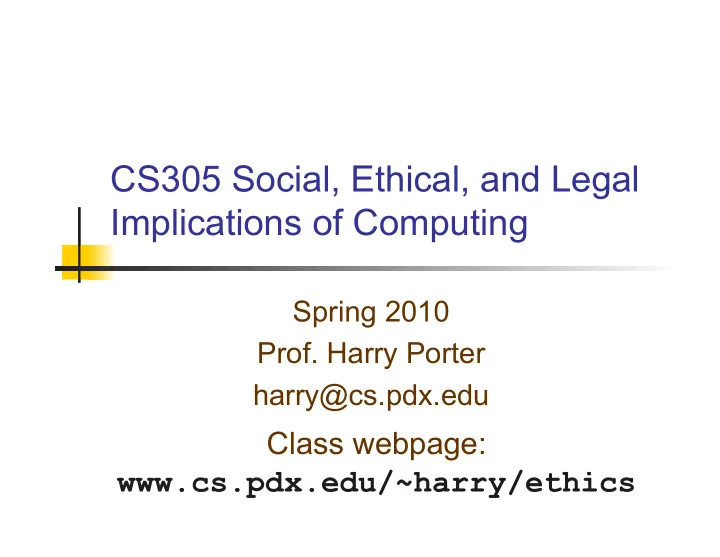

CS305 Social, Ethical, and Legal Implications of Computing Spring 2010 Prof. Harry Porter harry@cs.pdx.edu Class webpage: www.cs.pdx.edu/~harry/ethics
Slide Credits These slides were created by Prof. Jingke Li CS305-Spring 2010 Overview 2
Catalog Description History of computing Social context of computing Professional and ethical responsibilities Risks and liabilities of safety-critical systems Intellectual property Privacy and civil liberties Social implications of the Internet Computer crime Economic issues in computing CS305-Spring 2010 Overview 3
Course Goals Upon the successful completion of this course students will be able to: Identify the ethical issues that relate to computer science in real situations. Decide whether a given action is ethical as regards computer science professional ethics, and justify that decision. Recognize situations in which there may be legal issues as regards computer science and related topics such as intellectual property, and know some legal principles to apply. CS305-Spring 2010 Overview 4
Course Goals (cont.) Prepare and deliver a short professional-quality talk on a topic relating to ethical, legal, and social implications of computer science. Research and write a professional-quality paper about a topic relating to social, legal, and ethical implications of computer science. State several important impacts of computer science and related fields on society. State several examples of important ethical principles as they apply to computer science related situations. CS305-Spring 2010 Overview 5
Prerequisites A course in computer science at the 300 or higher level. Sophomore inquiry (or a course in public speaking and a course in writing a research paper). CS305-Spring 2010 Overview 6
Textbook Michael J. Quinn, “ Ethics for the Information Age ”, 4th, Addison Wesley, 2011. Another Reference (not reqd): Sara Baase, “ A Gift of Fire -- Social, Legal, and Ethical Issues for Computing and the Internet ”, 3rd ed, Pearson/Prentice Hall, 2007. CS305-Spring 2010 Overview 7
Course Organization Class Format: Lectures Discussions Student presentations Assignments: Weekly homeworks (abount five) Oral presentation Research paper CS305-Spring 2010 Overview 8
Homework Assigned weekly Bring hardcopy to class Due at before lecture starts!!! Involves mostly research on the Internet Provides materials for class discussions Staple pages!!! Include your name!!! CS305-Spring 2010 Overview 9
Class Discussions A block of time in each class is devoted to discussions Everyone is required to participate Learn to argue real cases based on legal or ethical principles CS305-Spring 2010 Overview 10
Oral Presentation Every student is required to give one 10 minute oral presentation to the class. Every student is required to submit a draft version of the slides (in PowerPoint or equivalent format) before the speech. Any of the course topics can be used as the base for the presentation. Detailed requirements and schedule will be available later. CS305-Spring 2010 Overview 11
Research Paper Every student is required to choose an issue related to one of the course topics and analyze it in a written paper. The paper must be 1800-2200 words in length. It must include a “My Opinion” section. A draft version of the paper needs to be submitted first. A student may choose the same topic for both paper and oral presentation. CS305-Spring 2010 Overview 12
Final Exam Take-home format, one or two days Similar to homework assignments CS305-Spring 2010 Overview 13
Grading Homework 15% Class participation 15% Paper 25% Draft 5%, paper 20% Presentation 25% Draft 5%, presentation 20% Final exam 15% 5% Attendance CS305-Spring 2010 Overview 14
Tentative Schedule Week 1: Syllabus & History of Computing Week 2: Ethical Theories Week 3: Intellectual Property Week 4: Privacy and Civil Liberties Week 5: Computer and Network Security Week 6: Computer Reliability Week 7: Professional Ethics; Impacts on Society Weeks 8-10: Student Presentations CS305-Spring 2010 Overview 15
Instructor Information Prof. Harry Porter Office: FAB 115-06 Office Hours: Mon, Wed, 3-4PM Email: harry@cs.pdx.edu CS305-Spring 2010 Overview 16
Location of Prof. Harry Porter’s Office Fourth Avenue Building, Room 115-06 C.S. Cubicle Office Area After 5 PM call: 503-725-4039 (or dial 5-4039 on the wall phone) From Lobby Overview 17
Misc Info Class webpage = syllabus www.cs.pdx.edu/~harry/ethics Mailing List Mailman: “PorterClassList” You must subscribe, details on webpage Attendance is required CS305-Spring 2010 Overview 18
First Assignment Read chapters 1 and 2 We’ll read entire textbook Homework #1 – due next Wednesday CS305-Spring 2010 Overview 19
Recommend
More recommend